INTRO
Plenty of real-life sports and puzzles have been made into video games. But in this story we look at an online game that has made the transition to the real world.
There' s no shooting or armies to command - rather, it' s a brain-teaser. Groups of players find themselves trapped in a room, or series of rooms, and have to look for clues together and find the way out.
PKG
This is Omega Room Escape, in central Beijing, one of the first room-escape centers in China.
Room-escape was originally based on an online brain-teaser from Japan called Crimson Room, made nearly a decade ago. In it, players have to find items in the room they can use to get out.
In the real-life game, the players are taken to a room, perhaps a prison cell, laboratory, or dungeon, and are then locked inside.
This one is meant to resemble a Third Reich office of some kind in the 1940s. Meanwhile, a second group has been taken somewhere else, and hopefully somehow they'll meet up in the middle. At first, players are often baffled as they try to get their bearings..
SOUNDBITE (ENGLISH) DEVIN WHITING:
"We' re ten minutes in. We've got a phone, a map, a keypad, a picture on the wall, a Nazi flag, and... we don' t have a clue."
Director Toby Chen, who co-founded the center with some partners in April last year, says this is normal.
SOUNDBITE (ENGLISH) TOBY CHEN, Director, Omega Workshop:
"When people come to play our games, we observe their reactions. The commonly observed reaction is they feel very excited. A little bit frightened. You have to psychologically rely on your teammates. So we see that people, when they solve their problems - they have some small tasks - and when they solve their problem, they' re very satisfied."
A clue could be a design on the wall. Or a note or video message left by a fictional character.
SOUNDBITE (ENGLISH) DEVIN WHITING
"We finally made a breakthrough. And we've got something here that looks like Morse code. It might be that we have to use this device to tap it in and see what happens."
This sound causes a cryptic hint to be projected onto the wall. The rooms are using increasingly advanced technology. Omega plans to introduce speech recognition - so players can, for example, say the "magic words."
Also, like in a bank heist movie, they plan to add criss-crossing lasers, guarded by a sensor, which players would have to navigate to reach the next stage of the game.
SOUNDBITE (ENGLISH) DEVIN WHITING:
"We've finally broken the Morse code signal. So we've opened the door, apparently. We're going to go in. We have no idea what's inside there."
Two teams meet up, and just have to put the final pieces of the puzzle together.
SOUNDBITE (ENGLISH) DEVIN WHITING:
"Alright, there we go! Ok, what do we have here? A key... and we're out! Just a bit of teamwork, outside-the-box thinking, and that did the trick!"
Director Chen says so far, it's had well over 50-thousand guests. It's been popular enough to open 11 more centers across China.
Some of Omega's biggest customers are businesspeople who come to hold teamwork exercises. Mr.Chen says they come to learn about themselves and their colleagues.
SOUNDBITE (ENGLISH) TOBY CHEN, Director, Omega Workshop
"These employees have to draw out of their daily life and know better about their teammates. So this is the first reason... team coordination, team spirit senses. The second reason I think the team managers can use this as a tool to analyze the team members. For example, some people who are very creative need a guardian to let them step a little bit away from their dreams, from the fancy things, to know a little bit about reality. Some people' s personally is very detailed thinking. Some are very general thinking. So in these games the manager will have a better understanding of his teammates because all these problem solving, all this psychological thinking, they will have a very good understanding of their teammates."
In an age where we're constantly glued to one screen or another, activities like room-escape could be a way to get back in touch with each other, face-to-face.
 简体中文
简体中文

